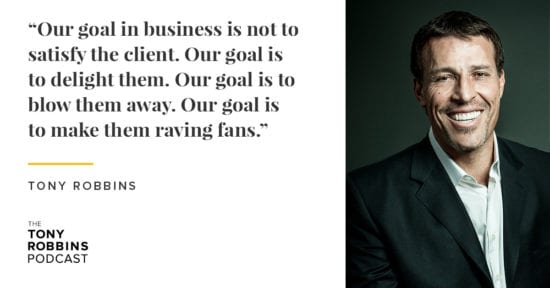Team Tony cultivates, curates and shares Tony Robbins’ stories and core principles, to help others achieve an extraordinary life.
What does company culture mean?
How to create a high-performing company culture
Culture.
This buzzword has saturated the contemporary job market, but what is company culture? What does company culture mean? On job boards, “culture” often translates to free snacks in the kitchen and limitless vacation days, but that’s missing the mark. Culture is about your company’s identity – a set of shared values and principles. Culture is the heartbeat of your business.
In this episode of The Tony Robbins Podcast, you’ll hear from Tony on what it takes to create a raving fan culture – both internally with your employees and externally with your clients.
Building a culture of raving fan customers
In the first part of the podcast, David Meerman Scott, a marketing growth strategist who uncovered the building blocks of what makes people raving fans of certain organizations, dives into the true meaning of fandom. What is it that makes someone a true, loyal fan? His research found there are three requirements:
- They’re eager to replicate the thing they’re a fan of.
- They’re eager to spend time and money doing it.
- The people who they share that fandom with are among their best friends.
Many organizations don’t believe they can build this sort of fanbase – but that’s not true. Any organization can build fans. David has found dentists and insurance companies with incredible fan bases.
The key is that people are hungry for true human connection. Most organizations treat customers as a number, grouping them all together and talking to them in the same way. But they really need to focus on and have a deep understanding of people – what motivates buyers, what makes that real human connection, what keeps customers happy.
Listen to the podcast for more on how existing organizations can tap into the power of fandom to create raving fan customers.
Building a culture of raving fan employees
In the second part of the podcast, we’ll hear from Daniel Coyle on why the best company cultures are built on trust. Coyle has dedicated his career to writing about the highest performing people and cultures on the planet, and he discovered one key to successful company culture that may surprise you: a sense of safety. When we feel safe, we feel certain. When we don’t feel safe, we shut down. The first thing a business has to do is send those signals of safety.
Coyle also talks about several common traps organizations fall into, including the trap of harmony, or the belief that the best company cultures transcend all problems, when the truth is that they find ways to navigate those problems together. Listen to the podcast for more surprising answers to the question, “What does company culture mean?” and learn how to start building your own productive culture today.

EPISODE NOTES
[00:55] Segment 1: Tony on raving fan culture
[01:40] Introduction: Why is culture important?
[02:45] Story of how FedEx created a raving fan culture
[03:20] FedEx on the verge of bankruptcy
[03:56] The urgent wedding dress delivery
[04:41] Finding a way to deliver the dress
[05:30] The dress is delivered by private plane, on time
[05:50] FedEx gets massive referrals
[06:44] Segment 2: David Meerman Scott on creating fandom
[07:38] Introduction to David’s work on fandom
[08:03] What makes David a raving fan
[08:30] Reiko’s passion for Harry Potter
[09:08] What makes people passionate
[09:50] Fandom comes from connection
[10:09] The 3 things that make someone a true fan
[10:40] Why some people think fandom is impossible
[11:30] How an insurance business created a fanbase
[13:25] How getting closer than usual creates fans
[13:56] How physical proximity creates emotion
[16:00] Getting people in a room together creates connection
[16:20] Importance of the personal zone of space
[16:46] How Tony engages people at events
[17:50] Mirror neurons bring the feeling of connection
[18:16] Creating physical connection virtually
[19:28] The importance of the selfie
[20:40] When customers become a number
[21:36] Focus on what motivates buyers
[22:10] Siri Lindley’s humanistic approach to performance
[25:10] Segment 3: Daniel Coyle on the culture of high performing groups
[26:30] Daniel’s approach to researching culture
[27:12] The 3 behaviors that determine success or failure
[27:35] How safety builds certainty
[28:27] Peter Skillman’s spaghetti tower contest
[30:30] Importance of status management and safety
[31:40] The San Antonio Spurs’ key to longstanding success
[32:26] What Coach Popovich does after a loss
[33:30] Belonging cues are the language of safety
[34:20] Great leaders tell the truth and express care
[35:06] Great cultures are not places of perfect harmony
[35:48] What Sheryl Sandberg asks employees
[36:16] Create safety by keeping an open face
[36:56] Laszlo Bock’s two line email
[37:25] Build bigger lunch tables to create interactions
[38:00] Sharing vulnerability and risk
[38:41] How Navy Seal Commander Dave Cooper created trust
[39:05] The four most important words a leader can say
[39:41] How the vulnerability loop creates trust and performance
[40:50] What Navy Seals do when they finish a mission
[41:44] Creating trust in a life threatening situation
[43:30] The words “tell me more”
[44:15] The “change one thing” question
[44:39] How after action reviews create vulnerability
[45:28] Creating a sense of purpose
[46:25] Johnson and Johnson’s gold standard of crisis response
[47:19] Johnson and Johnson’s credo of “what comes first?”
[48:53] Purpose is really navigation
[49:00] How restauranteur Danny Meyer creates purpose
[49:51] Danny’s value centered slogans
[52:09] The importance of building your own mantra map
Company culture isn’t about having a cool office or free beer or ping-pong tournaments. Those are distractions. Truly great cultures are places where people face hard problems, have tough conversations and navigate obstacles together – in an open and honest environment. They have great leaders who are willing to be vulnerable. They have positive habits that ultimately produce gain. They have a sense of purpose and a shared vision. And they succeed not only when the waters are calm, but when they are stormy.
About David Meerman Scott
David Meerman Scott spotted the real-time marketing revolution in its infancy and wrote five books about it including The New Rules of Marketing and PR, with more than 400,000 copies sold in English and available in 29 languages from Albanian to Vietnamese. His new book, Fanocracy (available early 2020) explores fandom – and what it is that makes some brands attract not just customers, or even loyal customers – but passionate fans. David is passionate about live music (he’s been to 790 live shows since he was 15 years old), the Apollo lunar program, and surfing.
 About Daniel Coyle
About Daniel Coyle
Daniel Coyle is the New York Times bestselling author of The Culture Code, The Talent Code, The Little Book of Talent, The Secret Race (co-authored with Tyler Hamilton), Hardball: A Season in Projects, and other books. Winner (with Hamilton) of the 2012 William Hill Sports Book of the Year Prize, he is a contributing editor for Outside Magazine, and works as a special advisor to the Cleveland Indians. Coyle lives in Cleveland, Ohio during the school year and in Homer, Alaska, during the summer with his wife Jen, and their four children.




